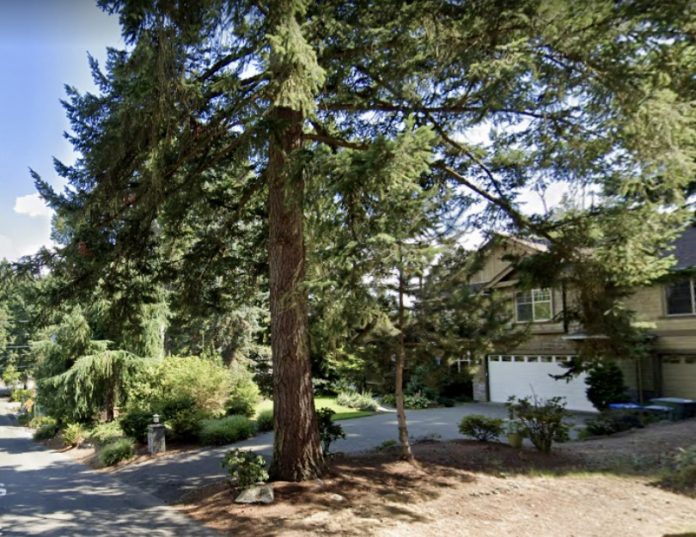
As reported last week, Kirkland’s recent updates to its tree codes have led to a lawsuit from the Master Builders’ Association of King and Snohomish Counties, who claim the new ordinance will be too onerous on necessary housing growth. Meanwhile, the city’s neighbors to the south are poised to advance their own tree ordinance through a proposal introduced by Bellevue Mayor Lynne Robinson at Monday’s City Council meeting. Although significantly smaller in scope, Robinson’s proposal would grant some interim protections to large trees before a more permanent tree ordinance is adopted early next year.
In Robinson’s proposal, before homeowners or developers could clear trees with a diameter of at least 24 inches (designated as landmark trees), they would need to first apply for a Clearing and Grading permit. According to city planning documents, the permit costs $464 for two or fewer trees ($857 for three or more trees) and can take between 5-9 weeks to process. In her comments Monday evening, Robinson identified safety, data, and awareness as the main motivators for her action.
She cited an incident in April where a Bellevue home was crushed by a neighbor’s 140 foot-tall Douglas fir during an impromptu and improperly-staffed tree removal job. By requiring a permit that can only be issued to a licensed contractor or a homeowner themselves, Robinson hopes to raise awareness of proper tree removal practices and reduce the potential for similar accidents.
Permits will also enable Bellevue staff to track the number of landmark trees that are being removed in the city, a figure that is currently unknown. The most recent city tree canopy survey estimated Bellevue’s tree canopy coverage at 37%, three percentage points below the city’s stated goal of 40%, but nearly 2/3 of that canopy is located in Bellevue’s suburban residential areas. Advocates like Khaiersta English, the founder of Trees4Livability, have alleged that trees in these areas are disappearing at an alarming rate because of lot clear-cutting during redevelopment. Members of the public have consistently testified at City Council meetings during 2022 to share anecdotes of landmark tree removals and to urge Council for stronger protections, testimony that likely motivated the Mayor to introduce her ordinance.
During public comment at Monday’s meeting, English praised the ordinance as “a good first step” and shared how she’s looking forward to further discussions later this year. At the end of March, Trees4Livability published a report with the organization’s recommendations for the outcome of those discussions, including a minimum tree density, increased tree replacement requirements, and a better enforcement mechanism. Full disclosure: Urbanist boardmember Ruth Lipscomb is involved with Trees4Livability.
No developer group has yet publicly raised issues with Bellevue’s tree code work like they have in Kirkland. With a minimum width of 24 inches instead of 26 inches though, Bellevue’s interim ordinance actually goes further than Kirkland’s in designating more trees as landmark trees. However, where Kirkland’s ordinance mandates the protection of such trees unless they impede growth, Bellevue’s interim ordinance only adds one additional step in the process before such trees can be lawfully removed under any circumstances. Kirkland’s ordinance also designates additional protections for groves of trees, defined as three trees of any size with overlapping crowns; similar provisions are not included in Bellevue’s interim ordinance.
With unanimous approval from Council on Monday evening, final language for the interim ordinance will return to the body for their approval at their June 21st meeting, with the provisions entering into effect five days later. With more permanent tree codes on the Council docket for this fall, Bellevue’s interim tree ordinance should not last as long as Seattle’s. As Urbanist reporter Natalie Bicknell Argerious wrote back in March, Seattle’s interim tree ordinances have now been in place for 13 years. A proposal emerged in 2018 to rectify the issue, but its determination of non-significance was successfully appealed by TreePAC and the issue was stalled. Seattle councilmembers aim to take another stab at the issue with a vote later this year, around the same time as their neighbors to the east are slated to review theirs.
Chris Randels is the founder and director of Complete Streets Bellevue, an advocacy organization looking to make it easier for people to get around Bellevue without a car. Chris lived in the Lake Hills neighborhood for nearly a decade and cares about reducing emissions and improving safety in the Eastside's largest city.

